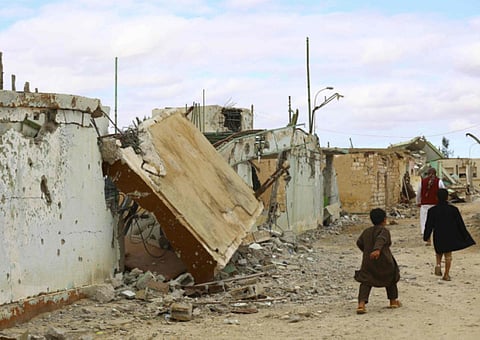Libyan problems require Libyan solutions
Time to bring key Libyan revolutionary-era players back to the fore

The United Nations should stop trying to broker ceasefires or political resolution between Libyans. It only exacerbates the situation.
The Libyans are better capable of finding an answer themselves. What the UN, and United Kingdom in particular, achieve by their interference on a political level is to further confuse the situation on the ground by continuing to indirectly empower and tacitly give recognition to the illegitimate pro-Muslim Brotherhood group holding Tripoli to ransom and aiming to have complete control of western Libya through the coalition Libya Dawn.
But, since much of America and Europe’s political rhetoric and military focus is now on the need to vanquish Daesh (Islamic State of Iraq and the Levant) in Syria and Iraq, why do these same western politicians and diplomats refuse to recognise and similarly confront this terror threat on the very shores of the Mediterranean? After all, earlier this month, a group in the eastern Libyan town of Derna pledged their allegiance to Daesh, making it the first Daesh franchise in North Africa and there have been reports of other groups, including in Tripoli, following suit.
The UN’s impotency was made clear during a grilling by CNN’s Becky Anderson last week, when UN Special Envoy to Libya, Bernadino Leon, described Daesh in Libya as “not high numbers” and “something manageable”. When further quizzed, he backed down with the feeble, rather contradictory statement: “I am not an expert on terrorist issues,” reminding the audience that the UN mandate in Libya was only to promote political dialogue.
One of few redeeming moments in the Leon interview was the comment that the “international community needed to work with Libyans to tackle this terrorist issue”. One way this could happen is with practical military help from Nato, which is how the regime change in Libya was achieved in 2011. However, surely, now is exactly the time when a terrorist expert is most needed in Libya — not someone who keeps insisting, in the face of mounting evidence that neither Libya’s internationally-recognised government nor the imposter “government” in Tripoli accepts the UN or the West’s attempts to broker peace. Quite the contrary is the reaction from most Libyans: It is not helping and they should back off.
The UN’s faintly tedious stance on dialogue and the continued silence of key powers runs the risk of being interpreted as a lack of support for Libya’s fight for democracy to prevail over terrorism, whether in the form of balaclava-wearing, gun-toting extremists or suited-and-booted Muslim Brotherhood Islamists. Furthermore, as the Libyan ambassador to the UN, Ebrahim Dabbashi, explained, this silence from the West — especially against the backdrop of the deeds-not-words approach the Libyan government and parliament is rolling out — is undermining the credibility and integrity of its claims to be committed to the global fight against terrorism in general and Daesh in particular.
The international community, however, remains largely silent. Continuing his criticism of the West, last week, Dabbashi called on the UK and US to review their positions with regard to Libya, pointing out: “If they are serious about fighting terrorism, Libya is doing this already.” The on-the-fence stance of both countries provoked Libya’s democratically-elected parliament, the House of Representatives, to release a statement reiterating that Operation Dignity, which is wresting back control of Benghazi from Ansar Al Sharia, was under the official Libyan Army, he said.
At this crucial juncture in Libya’s post-revolutionary fight to preserve the democracy it fought so hard to achieve, the West’s reticence in voicing support for either the military operations in Eastern Libya or even the House of Representatives itself, following the suspicious Supreme Court ruling against the House of Representatives, is now damaging the credibility of the UK, US and the UN far more than Libya, especially as other countries speak out in support of Libya.
The House of Representatives already has support of the UAE and Egypt, with Egyptian President Abdul Fattah Al Sissi just last week calling upon the US and Europe to help the Libyan Army in its fight against Islamist militants, saying that as Libya became an increasingly attractive region for terrorists, the same measures as the ones being used in Iraq and Syria could be applied in Libya, hence Al Sissi’s visit to Europe this week. Ergo, even if the UN sees Libya’s terrorism problem as still “manageable”, other countries fully-recognise the extent of the threat. Algeria, and later Tunisia, are taking action as Libya’s stability is crucial.
Perhaps now is the time to start bringing key Libyan revolutionary-era players back to the fore. Figures such as Dr Mahmoud Jibril and Mustafa Abdul Jalil spring to mind. Jibril was the main force behind gaining international legitimacy for the National Transitional Council in the early days of the revolution. In the first parliamentary elections, his political party, the National Forces Alliance (NFA), held the largest non-Islamist bloc in Libya’s parliament and he remains an important, though controversial, figure for Libyans. The House of Representatives also has a significant block of former NFA members that represent some 20 per cent of the parliament. Former members of the NFA could well be amongst those best-placed to find a mediated solution.
Libyan problems require Libyan solutions, not UN or western ones, although Nato’s help in eradicating terrorists — as they are doing in Iraq and Syria — will certainly not go amiss in Libya.
Richard Galustian is a business and security analyst who has lived in Libya since 2011.
Sign up for the Daily Briefing
Get the latest news and updates straight to your inbox


